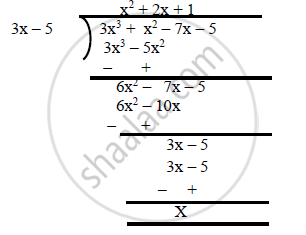Advertisements
Advertisements
प्रश्न
On dividing `3x^3 + x^2 + 2x + 5` is divided by a polynomial g(x), the quotient and remainder are (3x – 5) and (9x + 10) respectively. Find g(x).
उत्तर
By using division rule, we have
Dividend = Quotient × Divisor + Remainder
∴` 3x^3 + x^2 + 2x + 5 = (3x – 5)g(x) + 9x + 10`
⇒`3x^3 + x^2 + 2x + 5 – 9x – 10 = (3x – 5)g(x)`
⇒`3x^3 + x^2 – 7x – 5 = (3x – 5)g(x)`
⇒ `(g(x)=3x^3+x^2-7x-5)/(3x-5)`

`∴g(x) = x^2 + 2x + 1`
APPEARS IN
संबंधित प्रश्न
Find the zeroes of the following quadratic polynomial and verify the relationship between the zeroes and the coefficients:
3x2 – x – 4
Find a quadratic polynomial with the given numbers as the sum and product of its zeroes respectively.
`0, sqrt5`
If α and β are the zeros of the quadratic polynomial f(x) = x2 − 3x − 2, find a quadratic polynomial whose zeroes are `1/(2alpha+beta)+1/(2beta+alpha)`
If If α and β are the zeros of the quadratic polynomial f(x) = x2 – 2x + 3, find a polynomial whose roots are α + 2, β + 2.
Find the zeroes of the polynomial f(x) = `2sqrt3x^2-5x+sqrt3` and verify the relation between its zeroes and coefficients.
Find a cubic polynomial whose zeroes are `1/2, 1 and -3.`
Can the quadratic polynomial x2 + kx + k have equal zeroes for some odd integer k > 1?
If one of the zeroes of a quadratic polynomial of the form x2 + ax + b is the negative of the other, then it ______.
If p(x) = x2 + 5x + 6, then p(– 2) is ______.
Find a quadratic polynomial whose zeroes are 6 and – 3.
